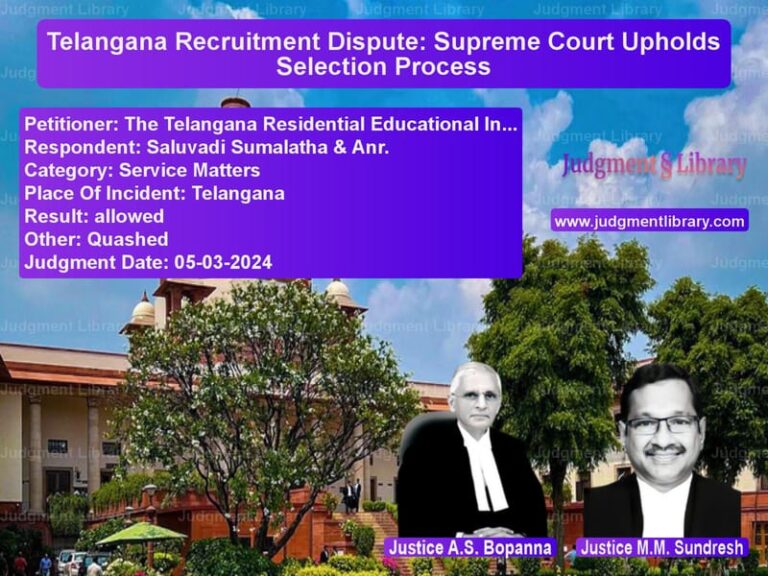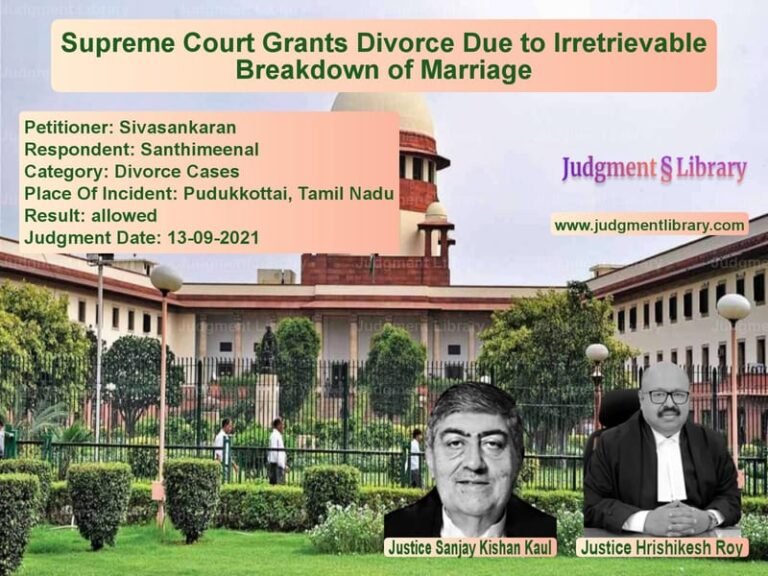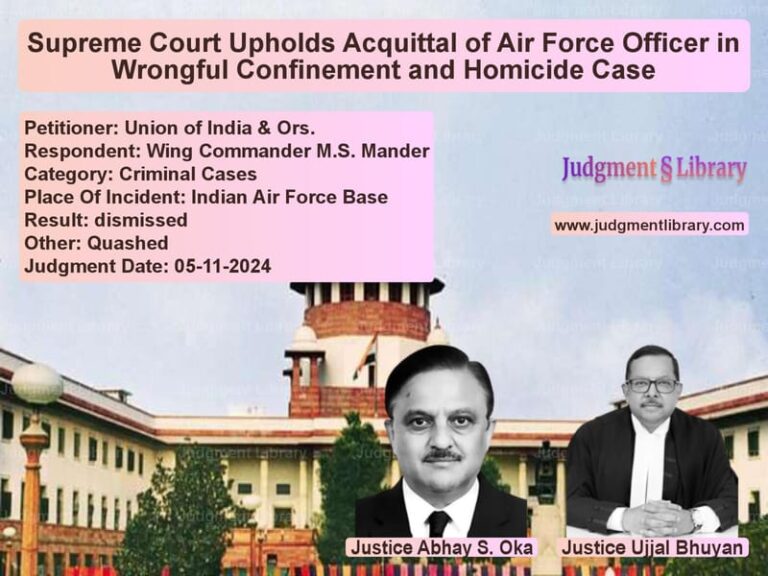Compassionate Appointment After Decades: Supreme Court Rejects Delayed Claim
The Supreme Court of India recently ruled in the case of The Government of India & Anr. vs. P. Venkatesh, addressing the issue of compassionate appointments and whether they can be granted decades after an employee’s death. This judgment is significant as it clarifies the intent behind compassionate employment and the limits on claiming such benefits.
Background of the Case
The case involved a dispute over a compassionate appointment sought by P. Venkatesh, the son of a deceased employee of the Union Ministry of Information and Broadcasting. His father passed away on 25 May 1996. Following his death, his widow initially applied for a compassionate appointment.
Key events in the case:
- On 3 January 1997, the widow’s application for compassionate appointment was rejected.
- Another representation was made and was rejected in a meeting held on 1 July 1999, where similar cases were considered.
- In 2007, the respondent (son of the deceased employee) initiated proceedings before the Central Administrative Tribunal (CAT), which directed the government to reconsider the case.
- In 2010, after further rejection, the respondent again moved the Tribunal, which led to reconsideration.
- On 25 August 2011, the request was rejected again, prompting another appeal before the Tribunal, which dismissed the claim.
- In 2016, the respondent approached the Madras High Court, which ruled in his favor, directing the government to grant him a compassionate appointment within three months.
Petitioner’s Arguments
The Government of India, represented by the Additional Solicitor General, made the following arguments:
- Compassionate appointment is meant to provide immediate relief to a family facing financial distress due to the loss of an employee.
- The claim was made nearly eleven years after the employee’s death and was further delayed by additional litigation.
- The policy governing compassionate appointments allowed a maximum consideration period of three years, which had long expired.
- The Tribunal had correctly dismissed the claim, and the High Court erred in overriding this decision.
Respondent’s Arguments
The respondent, P. Venkatesh, countered with the following points:
- His family was in financial distress following his father’s death, making him eligible for a compassionate appointment.
- The rejection of the initial application was arbitrary and should have been reconsidered.
- Although there was a delay, the government had not followed a fair process in handling his application.
- Other cases had been considered even after several years, so his request should not have been treated differently.
Supreme Court’s Observations
The Supreme Court analyzed the intent behind compassionate appointments and found that the request was highly delayed. The Court observed:
“Compassionate appointment is intended to enable the family of a deceased employee to tide over the crisis which is caused as a result of the death of an employee, while in harness. The essence of the claim lies in the immediacy of the need.”
Addressing the delay in making the claim, the Court stated:
“The first recourse to the Central Administrative Tribunal was in 2007, nearly eleven years after the death of the employee. By the time the High Court issued its direction on 9 August 2016, nearly twenty-one years had elapsed since the date of the death of the employee.”
The Court strongly criticized the tendency of tribunals and courts to repeatedly direct reconsideration of old claims, stating:
“This ‘dispose of the representation’ mantra is increasingly permeating the judicial process in the High Courts and the Tribunals. Such orders may make for quick or easy disposal of cases in overburdened adjudicatory institutions, but they do no service to the cause of justice.”
Final Judgment
The Supreme Court ruled as follows:
- The appeal by the Government of India was allowed.
- The judgment of the Madras High Court was set aside.
- The order of the Central Administrative Tribunal dismissing the original application was affirmed.
The Court concluded:
“The recourse to the Tribunal suffered from a delay of over a decade in the first instance. This staleness of the claim took away the very basis of providing compassionate appointment. The claim was liable to be rejected on that ground and ought to have been so rejected.”
Implications of the Verdict
This ruling has several important implications:
- Strict Time Limits on Compassionate Appointments: The Court has reinforced that such appointments must be sought and granted within a reasonable period.
- Judicial Accountability: The judgment criticizes lower courts and tribunals for mechanically directing reconsideration of cases, leading to unnecessary delays.
- Finality in Government Decisions: Once a claim has been rejected and the period for consideration has lapsed, further reconsideration should not be entertained.
- Precedent for Future Cases: The ruling will serve as a guideline for similar cases, ensuring that compassionate appointments are not treated as a vested right.
By emphasizing the importance of timely claims and procedural fairness, the Supreme Court has set a strong precedent for handling compassionate appointment cases in the future.
Petitioner Name: The Government of India & Anr..Respondent Name: P. Venkatesh.Judgment By: Justice D.Y. Chandrachud, Justice Hemant Gupta.Place Of Incident: Madras, India.Judgment Date: 01-03-2019.
Don’t miss out on the full details! Download the complete judgment in PDF format below and gain valuable insights instantly!
Download Judgment: The Government of In vs P. Venkatesh Supreme Court of India Judgment Dated 01-03-2019.pdf
Direct Downlaod Judgment: Direct downlaod this Judgment
See all petitions in Recruitment Policies
See all petitions in Public Sector Employees
See all petitions in Judgment by Dhananjaya Y Chandrachud
See all petitions in Judgment by Hemant Gupta
See all petitions in allowed
See all petitions in Quashed
See all petitions in supreme court of India judgments March 2019
See all petitions in 2019 judgments
See all posts in Service Matters Category
See all allowed petitions in Service Matters Category
See all Dismissed petitions in Service Matters Category
See all partially allowed petitions in Service Matters Category







